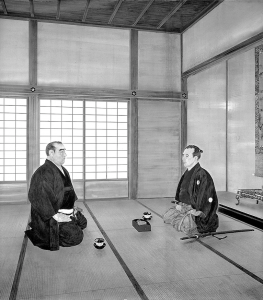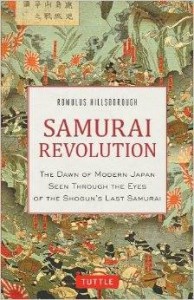Just as “a house in strife will fall, a country in strife will fall.” (一家不和を生ずれば、一家滅亡す。一国不和を生ずれば、其国滅亡すべし。)
“A house divided against itself cannot stand.” Abraham Lincoln, June 16, 1858
The peaceful surrender of the fallen shogun’s castle at Edo (modern-day Tokyo), negotiated in the spring of 1868, one day before a scheduled general attack on the capital by forces of the new Imperial government, is “the most beautiful event in Japanese history,” according to Saigo Takamori’s biographer Kaionji Chogoro. It was a result of amicable talks between the military leaders of the opposing sides: Katsu Kaishu representing the shogun, and Saigo, the de facto commander of the Imperial forces. Kaionji’s perceived “beauty” lay in the fact that a devastating civil war was thereby averted, sparing Edo’s population of well over a million from untold misery.

But even after the castle was surrendered, thousands of samurai in Edo refused to yield to draconian treatment by the Imperial government, including confiscation of their landholdings, which would leave them without a livelihood. With a final military showdown imminent, Kaishu sent a letter to Saigo warning him of the dire consequences of the unfair treatment. “Where do you expect them to vent their enmity?” But if the government would treat his people fairly, Kaishu assured Saigo, “the people would happily submit.” But, he ominously warned, just as “a house in strife will fall, a country in strife will fall”–and though Kaishu certainly admired Abraham Lincoln, it is unknown whether or not he was mindful of his famous dictum of a “house divided” uttered a decade earlier.
(Katsu Kaishu is the “shogun’s last samurai” of my Samurai Revolution. The image of Saigo and Kaishu negotiating the surrender of Edo Castle is used in my Samurai Tales, courtesy of Seitoku Kinen Kaigakan.)
For updates about new content, connect with me on Facebook.

